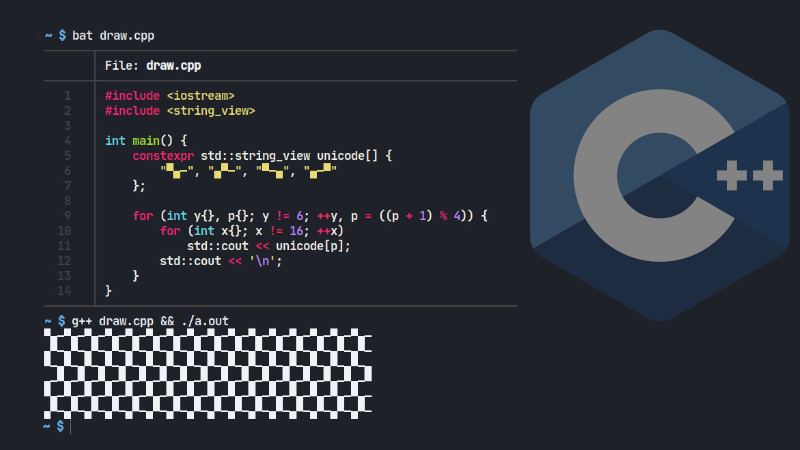
std::string_view is a class named basic_string_view that uses char and std::char_traits , both as a template.
It is only available from C++17 and needs to include the string_view header. Can be implemented also for accented letters(std::wstring_view), unicode 8(std::u8string_view), 16(std::u16string_view, C++20) and 32(std::u32string_view ) .
It pretty much creates an array of characters for a string.
Each character is an index:
| T | e | r | m | i | n | a | l | R | o | o | t | |
|---|---|---|---|---|---|---|---|---|---|---|---|---|
| 0 | 1 | 2 | 3 | 4 | 5 | 6 | 7 | 8 | 9 | 10 | 11 | 12 |
It is widely used in code that parses.
Let’s see 10 examples of using it!
01. Basic usage, declaring, initializing and printing a string_view
std::string_view sv {"Terminal Root"};
std::cout << sv << '\n';02. Print only the 4th (fourth character)
std::cout << sv[3] << '\n'; // m
03. Get the size of the string_view
std::cout << sv.size() << '\n'; // 13#04. Print the last character
std::cout << sv.back() << '\n'; // t05. Know the position of the character 'i'
std::cout << sv.find("i") << '\n'; // 4#06. Knowing the back to front position
std::cout << sv.rfind("o") << '\n'; // 11It would be the 1st ‘o’ backwards, the
find()would be 10 . Another note is if you enter a character that doesn’t exist, it will give garbage(string::npos, a weird number).
07. Check for 'X' character
std::cout << sv.find("X") << '\n'; // garbage08. Print 9th to 13th character
std::cout << sv.substr(9, 13) << '\n'; // root09. Remove the last 4 characters
sv.remove_suffix(4);
std::cout << sv << '\n'; // Terminal#10. Remove the first 8 characters
sv.remove_prefix(8);
std::cout << sv << '\n'; // 'Root'
bonus
You can also use string_view_literals by adding the term sv to the end, example code with literal:
#include <iostream>
#include <string_view>
using namespace std::string_view_literals;
int main(){
auto literal = "Terminal Root"sv;
std::cout << literal << '\n';
return 0;
}Example of a ready code:
#include <iostream>
#include <string_view>
int main() {
constexpr std::string_view unicode[] {
"▀▄─", "▄▀─", "▀─▄", "▄─▀"
};
for (int y{}, p{}; y != 6; ++y, p = ((p + 1) % 4)) {
for (int x{}; x != 16; ++x)
std::cout << unicode[p];
std::cout << '\n';
}
}Saída:
▀▄─▀▄─▀▄─▀▄─▀▄─▀▄─▀▄─▀▄─▀▄─▀▄─▀▄─▀▄─▀▄─▀▄─▀▄─▀▄─
▄▀─▄▀─▄▀─▄▀─▄▀─▄▀─▄▀─▄▀─▄▀─▄▀─▄▀─▄▀─▄▀─▄▀─▄▀─▄▀─
▀─▄▀─▄▀─▄▀─▄▀─▄▀─▄▀─▄▀─▄▀─▄▀─▄▀─▄▀─▄▀─▄▀─▄▀─▄▀─▄
▄─▀▄─▀▄─▀▄─▀▄─▀▄─▀▄─▀▄─▀▄─▀▄─▀▄─▀▄─▀▄─▀▄─▀▄─▀▄─▀
▀▄─▀▄─▀▄─▀▄─▀▄─▀▄─▀▄─▀▄─▀▄─▀▄─▀▄─▀▄─▀▄─▀▄─▀▄─▀▄─
▄▀─▄▀─▄▀─▄▀─▄▀─▄▀─▄▀─▄▀─▄▀─▄▀─▄▀─▄▀─▄▀─▄▀─▄▀─▄▀─Some other functions are only available in C++20 or C++23, examples: contains(), starts_with() and others.
For more information visit: https://en.cppreference.com/w/cpp/string/basic_string_view .




